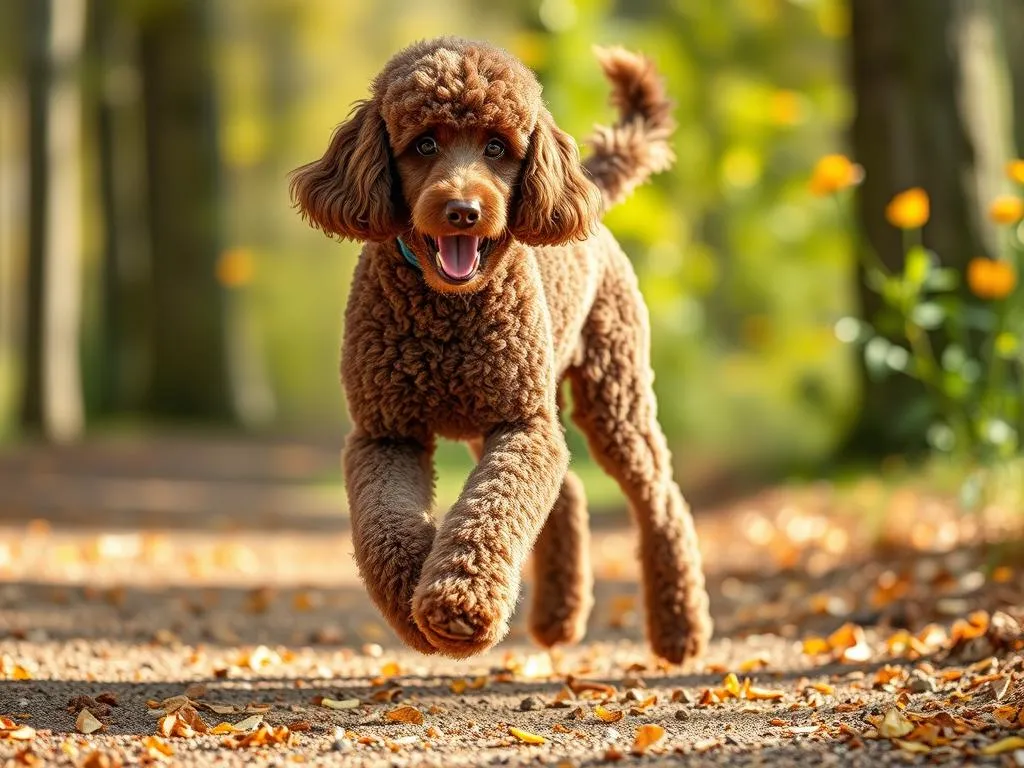
Maintaining your poodle’s health is crucial for their overall happiness and longevity. While many dog owners are aware of the need for proper nutrition and regular veterinary care, one of the most critical aspects often overlooked is exercise. Understanding how much exercise a poodle needs is vital to prevent health issues and ensure your furry friend remains active and joyful.
Understanding Dog Health Care
Definition of Dog Health Care
Dog health care encompasses a range of practices aimed at maintaining and improving your dog’s physical and mental well-being. It involves preventive measures such as regular veterinary visits, vaccinations, nutrition, exercise, and grooming. Just like humans, dogs require a holistic approach to health, which includes both physical and emotional care.
Common Health Issues in Dogs
Dogs can face a variety of health problems, often exacerbated by lifestyle factors. Common issues include:
- Obesity: A significant concern for many breeds, including poodles, leading to various health complications.
- Dental Problems: Poor oral hygiene can result in serious dental diseases.
- Skin Conditions: Allergies and skin infections can affect poodles, particularly due to their unique coat type.
Understanding these potential issues is crucial for dog owners to implement preventive care and maintain their poodle’s health.
The Role of Exercise in Dog Health
Benefits of Regular Exercise
Regular exercise is not just about keeping your dog physically fit; it plays a vital role in their mental health as well. Here are some benefits:
- Weight Management: Regular physical activity helps maintain a healthy weight, reducing the risk of obesity-related diseases.
- Cardiovascular Health: Exercise strengthens the heart and improves circulation.
- Mental Stimulation: Engaging in physical activities can alleviate boredom and reduce behavioral problems.
How Much Exercise Does a Poodle Need?
When it comes to determining how much exercise a poodle needs, several factors come into play, including the dog’s age, size, and individual energy levels. Generally, poodles require:
- Daily Exercise: On average, adult poodles need at least 30 to 60 minutes of exercise each day.
- Puppies and Young Dogs: Younger poodles have higher energy levels and may need up to 90 minutes of exercise daily, divided into shorter play sessions.
- Senior Poodles: Older dogs may require less vigorous activity, around 20 to 30 minutes, focusing on gentle walks.
Recommended Daily Exercise Routines
A well-rounded exercise routine for your poodle should include:
- Walks: Daily walks can be a great way to provide exercise and mental stimulation. Aim for at least one long walk combined with shorter strolls throughout the day.
- Playtime: Engaging in games like fetch or tug-of-war can help burn off excess energy.
- Socialization: Allowing your poodle to interact with other dogs can be beneficial for their social skills and mental health.
Signs of Insufficient Exercise in Poodles
If your poodle is not getting enough exercise, you may notice:
- Excessive barking or whining
- Destructive behaviors, like chewing furniture or digging
- Weight gain or lethargy
- Difficulty in sleeping
Recognizing these signs can help you adjust your poodle’s routine to meet their exercise needs.
Nutrition and Diet
Understanding Dog Nutrition
A balanced diet is essential for your poodle’s health. Key nutrients that should be included are:
- Proteins: Essential for growth, maintenance, and repair of tissues.
- Fats: Provide energy and support cell function.
- Vitamins and Minerals: Crucial for various bodily functions, including immune support.
Choosing the Right Dog Food
When selecting food for your poodle, consider:
- Age: Puppies, adults, and seniors have different nutritional needs.
- Size: Small, medium, and large breeds have unique dietary requirements.
- Activity Level: More active dogs may require higher calories.
Additionally, poodles may have special dietary needs, such as managing allergies or maintaining a healthy weight. Always consult your veterinarian for tailored advice.
Regular Veterinary Care
Importance of Routine Check-ups
Regular veterinary visits are essential for early detection of health issues. A standard check-up typically includes:
- Physical Examination: Assessing your dog’s overall health.
- Vaccination Updates: Keeping your poodle protected against common diseases.
- Parasite Control: Regular treatments for fleas, ticks, and worms.
Recommended Vaccination Schedule for Poodles
Poodles should follow a vaccination schedule that includes:
- Puppy Vaccines: Started at 6-8 weeks of age, with boosters every 3-4 weeks until 16 weeks.
- Adult Vaccines: Typically administered every 1-3 years, depending on the vaccine type.
Consult your veterinarian for the best vaccination plan for your poodle.
Dental Care
Oral health is critical for dogs, as dental diseases can lead to more severe health issues. Tips for maintaining your poodle’s dental hygiene include:
- Regular Brushing: Aim to brush your poodle’s teeth at least 2-3 times a week.
- Dental Chews: Use vet-approved dental chews to help reduce plaque and tartar buildup.
- Routine Veterinary Dental Cleanings: Schedule professional cleanings as recommended by your vet.
Grooming for Health
Grooming Needs Specific to Poodles
Poodles have a unique coat that requires regular grooming to prevent matting and skin issues. Key grooming practices include:
- Brushing: Daily brushing helps remove loose hair and prevents matting.
- Bathing: Bathe your poodle every 3-4 weeks, using a gentle dog shampoo.
- Trimming: Regular trims are necessary to maintain their coat and keep them comfortable.
Benefits of Regular Grooming
Grooming is not just about aesthetics; it also impacts your poodle’s health:
- Skin Health: Regular grooming helps prevent skin irritations and infections.
- Bonding Time: Grooming sessions strengthen the bond between you and your dog, promoting emotional well-being.
Mental Health and Well-Being
The Importance of Mental Stimulation
Mental stimulation is crucial for a poodle’s overall well-being. Activities that promote mental health include:
- Interactive Toys: Puzzle toys can challenge your dog’s problem-solving skills.
- Training Sessions: Teaching new tricks or commands can be both fun and mentally engaging.
Recognizing Signs of Stress or Anxiety
Poodles, like many dogs, can experience stress or anxiety, which can manifest as:
- Excessive barking or whining
- Destructive behavior
- Changes in eating or sleeping patterns
If you notice these signs, consider adjusting your poodle’s environment and routine to reduce stress and promote a sense of security.
Creating a Balanced Routine
Combining Exercise, Diet, and Mental Stimulation
To maintain your poodle’s health, it’s essential to create a balanced daily routine that incorporates:
- Exercise: Aim for at least 30-60 minutes of physical activity each day.
- Quality Diet: Provide balanced nutrition tailored to your poodle’s age and activity level.
- Mental Engagement: Include training and playtime to stimulate their mind.
Example of a Daily Routine for a Poodle
Here’s a sample daily schedule to help you structure your poodle’s day:
| Time | Activity |
|---|---|
| 7:00 AM | Morning walk (30 minutes) |
| 8:00 AM | Breakfast (high-quality dog food) |
| 9:00 AM | Playtime (fetch or tug-of-war) |
| 12:00 PM | Short walk (15 minutes) |
| 1:00 PM | Training session (15-20 minutes) |
| 5:00 PM | Evening walk (30 minutes) |
| 6:00 PM | Dinner (same high-quality dog food) |
| 7:00 PM | Interactive play (puzzle toys) |
| 9:00 PM | Relaxation time and cuddles |
This schedule ensures your poodle receives a well-rounded combination of exercise, nourishment, and mental engagement.
Conclusion
Maintaining your poodle’s health is a multifaceted endeavor that requires attention to exercise, nutrition, veterinary care, grooming, and mental well-being. Understanding how much exercise a poodle needs is integral to their overall health and happiness. By implementing a structured routine that includes regular physical activity, a balanced diet, routine check-ups, and mental stimulation, you can ensure your poodle leads a long, healthy, and fulfilling life.
Being proactive about dog health care not only benefits your poodle but also enhances the bond you share. Happy and healthy dogs make for joyful companions, and it’s our responsibility as pet owners to provide the best care possible.









